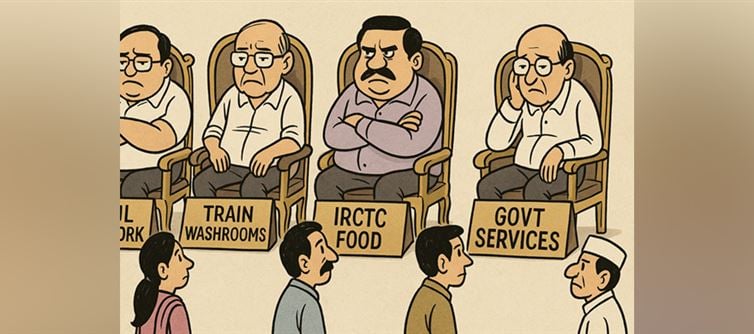
Every indian knows this feeling: you step into a government department and instantly feel transported back in time. Slow systems, rude staff, dirty facilities, ugly websites, endless delays — it’s like india is racing toward 2050 while its government services are stuck in 1942 mode. Why? Because the “public servant” still acts like a “public master.”
india gained independence.
But the mindset inside government offices never did.
The british left — the bureaucracy they built stayed.
Power stayed. Privilege stayed.
Only accountability never arrived.
And now we’re paying the price for a system designed to serve the rulers, not the public.
1. BSNL’s Poor Network: A 21st Century Country With 1990s Telecom
bsnl should have been India’s telecom giant.
Instead, it became a museum.
Slow networks, outdated towers, zero innovation.
Why? Because nobody inside bsnl loses their job for bad service.
When failure has no consequences, mediocrity becomes culture.
2. train Washrooms Still Dirty: The Nation Moves, Hygiene Doesn’t
indian Railways connects the entire country — but can’t keep a toilet clean for more than an hour.
Dirty floors, broken taps, stink that could wake the dead.
Privatized trains manage it.
Why can’t the government?
Because for decades, “public property” = nobody’s responsibility.
3. irctc Food: The Great indian Stomach Risk
Cold food.
Overpriced meals.
Stale snacks.
And the legendary complaint: “Sir, yahi available hai.”
Why improve when passengers have no choice and no competitor exists?
Monopoly creates comfort. Comfort kills quality.
4. AAI Airports: From Entry Gate to Exit Gate — One Long Apology
Not all AAI airports are bad, but too many still feel like outdated bus stands with airplanes.
Poor maintenance.
Zero aesthetic sense.
Inefficient queues.
AAI works, but never competes.
And what doesn’t compete → doesn’t grow.
5. government Websites: Designed to Fail, Built to Frustrate
Half the links don’t work.
The UI looks like Windows XP tribute art.
They crash right before payment.
Why? Because contracts are given to the lowest bidder, not the best builder.
Cheap code → costly citizen suffering.
6. EPFO Rejections and Delays: The Ultimate Test of Your Patience
people withdraw their own money, and EPFO behaves like it’s doing them a personal favour.
Rejections for minor mistakes.
Files have been under process for months.
Offices are slower than glaciers.
Because in government systems, delay is not a problem — it’s tradition.
⚔️ 7. The ROOT Problem: A Colonial Mindset That Never Died
The british designed the indian bureaucracy to control, not serve.
After independence:
The same chairs stayed
The same files stayed
The same culture stayed
The same sense of entitlement stayed
The chair became a throne.
Responsibility became optional.
Privilege became the default.
No one feels accountable because the system never demanded accountability.
💣 8. Corruption Isn’t the Problem — Normalisation of Corruption Is
A bribe is no longer “wrong.”
It’s “just how things work.”
Politicians may call it compulsion.
But many officers treat corruption like a hereditary right.
When exploitation becomes culture, service becomes sacrifice — and the citizen pays the price.
🔥 FINAL WORD: WHY GOVT services ARE BELOW AVERAGE
Because they were never designed to be excellent.
They were designed to be power hubs, not service hubs.
India modernised.
The private sector sprinted.
The people evolved.
But government offices?
They’re still wearing the same colonial uniform — mentally and structurally.
Until the mindset shifts from “I have power” to “I have responsibility”, india will keep building bullet trains while its government services remain bullock-cart slow.




 click and follow Indiaherald WhatsApp channel
click and follow Indiaherald WhatsApp channel